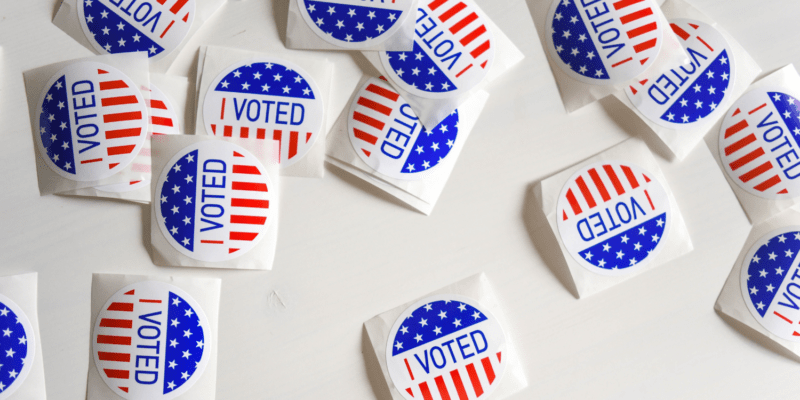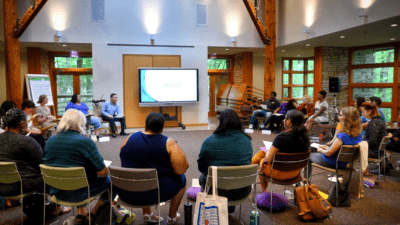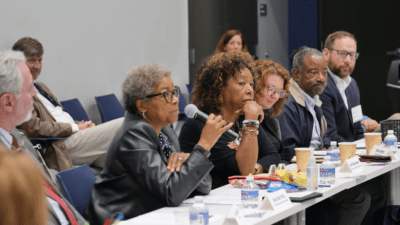In the W.K. Kellogg Foundation’s priority places and across our nation, the 2022 midterm elections present some answers to pressing questions on our country’s governance and future. While a few state and national races remain yet to be called, we can say with certainty that the midterm elections were neither a Republican “red wave” nor a Democratic surprise. Federally, control of the US House of Representatives will shift from Democrat to Republican, but by a narrower margin than initially anticipated, while the Democratic party has kept control of the U.S. Senate by a very narrow margin. In state races, incumbent parties retained power, except for Democrats picking up control in the Michigan, Minnesota, and Pennsylvania legislatures.
No election can tell us everything, but a few trendlines are emerging worth noting.
- The electoral process worked. Turnout was good, counting vote results has been smooth, and most losing candidates have accepted the results. Exit polls said that 79% were confident that elections are being conducted fairly and accurately. Turnout was especially high in several battleground states, where expectations of a close contest appeared to boost participation, such as in Pennsylvania, Wisconsin, and Michigan.
- Party allegiance is not enough of a motivating factor for voters to accept any candidate. According to early research, voters were willing to put aside partisan identity and vote against divisive, polarizing candidates regarded as being outside the political mainstream.
- Issues matter. Ballot measures appear to have energized voters and proved to be a significant draw to the polls. In several instances, issues transcended the prevailing politics. Medicaid expansion won in South Dakota; $15 minimum wage was approved in Nebraska; and voters took a stand to preserve voting rights and access to ballot measures in numerous states. Notably, in New Mexico, advocates are celebrating a groundbreaking early childhood education funding measure that makes the state the first in the country to guarantee a constitutional right to early childhood education.
- Voters are seeking racial equity in their representatives. For many communities of color, political representation is a catalyst for progress in racial equality and holding government institutions accountable. Both Republican and Democrat parties recruited a record number of Black and Latinx persons to run in the midterm elections. The incoming 118th Congress is on track to be the most racially diverse in history among Democrats and Republicans. This increased diversity can help inform and shape the policy debates. However, despite this diversity, according to reporting, recent surges in threats and violence against elected officials have especially discouraged Black women from running.
The 2022 midterm elections have produced some important results for diversity, equity, and inclusion. An example of a few stand-out results include:
- Wes Moore becomes the first Black person elected governor in Maryland’s history and only the third Black governor elected in US history.
- Maura Healey of Massachusetts and Tina Kotek of Oregon are the country’s first LGBTQ women elected governors.
- With the change of political control in Michigan’s legislature, the state will see the first Black Speaker of the House (Joe Tate from Detroit) and woman to serve as Majority Leader in the State Senate (Winnie Brinks from Grand Rapids).
- At 32%, Mississippi experienced the lowest voter turnout in the country, particularly among people of color. A lack of salient issues on the ballot, off-year elections for the Governor and legislature, as well as newly imposed voter restrictions were likely culprits according to a WKKF grantee.
- Summer Lee became the first Black woman elected to Congress from Pennsylvania.
- Markwayne Mullin will become the first Native American US Senator in nearly two decades and the first Native American US Senator from Oklahoma in a century.
- In Connecticut, Erick Russell won the race to serve as treasurer, becoming the first-ever Black out LGBTQ candidate elected to statewide office in US history.
- Maxwell Frost (25 years old) won in Florida’s 10th Congressional District, making him the first member of Generation Z elected to serve in the US Congress. Frost ran on a platform supporting greater health care access, gun violence prevention, and the environment.
- Young voters turned out. Preliminary research suggests that voter midterm election turnout, especially among young voters aged 18-29, is historically high compared to other non-presidential election years. It is estimated that 27% of young voters cast a ballot in 2022. This follows an increase in issue activism that has grown since 2020. While college students can be motivated to vote, they often face significant obstacles in voting restrictions and increased barriers. The effort which Generation Z appears to be willing to put in for their representation bodes well for the future of our nation.
For over ninety years, the W.K. Kellogg Foundation has been committed to engaging with local partners to provide all children with an equal opportunity to thrive. In our priority places, across the nation, and around the world, WKKF continues to invest in individuals and organizations that support children’s health, happiness and well-being by supporting working families and creating equitable communities.
Built into our DNA is persistent community engagement, a collaborative effort which puts directly affected individuals at the center of decision-making. When all citizens have free and fair access to elect their political representatives, we see the same kind of community engagement that provides all people with the agency and ability to shape the policies that affect their lives. In the same way, we celebrate the election of locally-grounded, diverse, intergenerational and compassionate leaders on any side of the aisle who seek meaningful and enduring change for their constituents. When leaders are raised up and given the opportunity to address gaps in education, health and the economy, the winner will always be the health, education and economic well-being of children, families and communities.








Comments